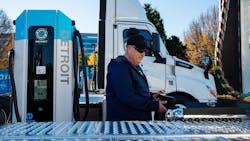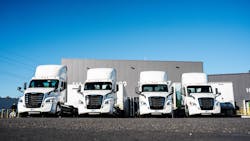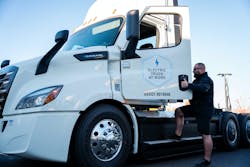DTNA adds Freightliner EVs to its inbound logistics network
Daimler Truck North America is integrating battery-electric Freightliner eCascadia trucks into its production and aftermarket logistics operations by utilizing its "Electric Island," the first-of-its-kind heavy-duty electric truck charging site that opened in 2021 in Portland, Oregon,
While much of the trucking industry faces charging infrastructure challenges, DTNA designed its massive charging site to accelerate the development, testing, and deployment of zero-emission commercial vehicles and provide the necessary infrastructure to support its sustainable logistics vision.
"By integrating electric trucks into our inbound logistics network, we aim to reduce our environmental impact and contribute to a more sustainable future that goes beyond truck development and manufacturing," said Jeff Allen, SVP of operations and specialty vehicles at DTNA. "Sustainability is a cornerstone of our corporate governance. We take the associated responsibility for our employees, for the environment, and for society as a whole very seriously."
Four Freightliner eCascadia Class 8 trucks, launched in 2022, will be used to pick up parts from supplier locations in the Pacific Northwest and deliver them to DTNA's consolidation center in Portland. From the consolidation center, the parts are then shipped to DTNA's North American manufacturing plants and aftermarket parts distribution centers, serving customers across the United States and Canada.
See also: 'Pretty good story': Daimler to boost Western Star capacity
Daimler Truck customer Schneider National's battery-electric fleet of Freightliner eCascadias recently reached a zero-emission milestone as the giant fleet (No. 7 FleetOwner 500: For-Hire) surpassed one million miles of freight hauling in less than a year.
The mega carrier's first electric trucks began hauling customers' freight in January. It now has 94 electric vehicles, including 92 battery-electric trucks and two electric yard spotters, in its California-based operations. The eCascadias have avoided approximately 3.3 million pounds of carbon dioxide emissions—the equivalent of removing more than 330 gas-powered passenger vehicles from the road for a year, according to the fleet and DTNA.
The OEM also recently delivered 20 eCascadia tractors to Reyes Coca-Cola Bottling, a West Coast and Midwest bottler and distributor of Coca-Cola brands. These electric vehicles joined RCCB's fleet of delivery trucks in Downey, California, and were the first zero-emission heavy-duty tractors in the California fleet. RCCB is part of Reyes Holdings, which ranks No. 35 on the FleetOwner 500: Private and is the seventh largest food product private fleet in the U.S.
In 2020, the Portland truck manufacturing plant, where the eCascadia is built, achieved CO₂-neutral production with reduced energy consumption and offsetting on-site emissions. DTNA plans to incorporate CO₂-neutral production at its remaining truck manufacturing plants by 2025. Moreover, DTNA is developing solutions to optimize the lifecycle of batteries used in their electric trucks, including remanufacturing, repurposing, and end-of-life recycling.
About the Author
FleetOwner Staff
Our Editorial Team
Kevin Jones, Editorial Director, Commercial Vehicle Group
Josh Fisher, Editor-in-Chief
Jade Brasher, Senior Editor
Jeremy Wolfe, Editor
Jenna Hume, Digital Editor
Eric Van Egeren, Art Director


